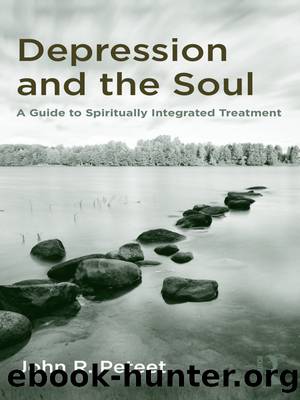Depression and the Soul by Peteet John R.;

Author:Peteet, John R.; [JOHN R. PETEET]
Language: eng
Format: epub
Publisher: Taylor & Francis Group
Published: 2011-08-05T00:00:00+00:00
Formulation
Clinical assessment ideally culminates in the construction of an empirically grounded, comprehensive case formulation that (1) organizes the key facts of case around a centrally important causal/explanatory source, (2) frames this source in terms of factors amenable to direct intervention, and (3) anticipates the potential role of both risk and protective factors in the treatment (In a psychodynamic formulation, these would include how the patientâs central conflict is likely to play out in resistance, transference, and countertransference). Traditional, multiaxial diagnostic formulations attempt to characterize various dimensions of the patientâs difficulties using standardized criteria. Recognizing the importance of contextualizing these in relation to genetic and constitutional factors, psychological processes such as motivation, ego functioning, and sociocultural factors, Faulkner et al. (1985) have called for flexibility in individualizing the clinicianâs understanding of the case. One step in this direction was the inclusion of an Outline for a Cultural Formulation in DSM-IV. One of its authors* has since proposed ways that the Outline for DSM-V could be revised to include religious and spiritual factors.
In practical terms, to integrate information about the depressed patientâs existential concerns and spiritual life into the formulation of the case, it may help to ask the following questions: What are the patientâs vulnerabilities to depressed mood? What is the relationship among these factors? Why has the individual become symptomatic now? What is causing him the most impairment or distress? What resources are available for addressing his current state and underlying vulnerabilities? And what are the obstacles to drawing on these resources?
What are the patientâs vulnerabilities to depression? Is there a biological diathesis (melancholic, psychotic, bipolar, or personality-based depression), an unresolved legacy of trauma, disappointment related to unrealistic expectations (demoralization, adjustment disorder, ordinary unhappiness), a set of consequences stemming from addiction-related or other behavior (addiction, guilt), or an impasse in dealing with life (choice in the case of angst, loss in the case of grief, or the dark night of the soul in the case of a relationship to God)?
What is the relationship among these vulnerabilities? Which seem to be primary and which secondary? A patient may present suicidal and preoccupied by guilt that is related to addiction behavior. He may be devastated after the loss of a relationship because he lacks basic trust due to early trauma, because he has expected that person to provide unconditional love, or to make up for the loss of an inadequate parent. Or his relationship to God may suffer from the same kind of fear and avoidance that mark his relationship with other potential sources of help.
Why has the individual become symptomatic now? Is the presenting episode representative of a pattern, for example of seasonal depression, of despair after a particular kind of loss, or of expecting too much from another poorly chosen partner? The personal meaning of the precipitating stressor determines its significance. An inability to read may be devastating to a patient who has valued his mind, but not to one who does not.
What is impairing or distressing him most? Whereas
Download
This site does not store any files on its server. We only index and link to content provided by other sites. Please contact the content providers to delete copyright contents if any and email us, we'll remove relevant links or contents immediately.
Unwinding Anxiety by Judson Brewer(72977)
The Art of Coaching by Elena Aguilar(53165)
The Fast Metabolism Diet Cookbook by Haylie Pomroy(21126)
Rewire Your Anxious Brain by Catherine M. Pittman(18632)
Healthy Aging For Dummies by Brent Agin & Sharon Perkins RN(17033)
Talking to Strangers by Malcolm Gladwell(13339)
The Art of Thinking Clearly by Rolf Dobelli(10407)
Mindhunter: Inside the FBI's Elite Serial Crime Unit by John E. Douglas & Mark Olshaker(9312)
Crazy Rich Asians by Kevin Kwan(9271)
The Compound Effect by Darren Hardy(8918)
Tools of Titans by Timothy Ferriss(8360)
Periodization Training for Sports by Tudor Bompa(8247)
Becoming Supernatural by Dr. Joe Dispenza(8194)
Wonder by R. J. Palacio(8095)
Crystal Healing for Women by Mariah K. Lyons(7919)
Bodyweight Strength Training by Jay Cardiello(7902)
Change Your Questions, Change Your Life by Marilee Adams(7732)
Therapeutic Modalities for Musculoskeletal Injuries, 4E by Craig R. Denegar & Ethan Saliba & Susan Saliba(7710)
Nudge - Improving Decisions about Health, Wealth, and Happiness by Thaler Sunstein(7689)
